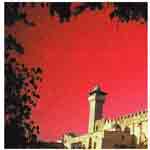Reading Hebron – a play by Jason Sherman
A Play by Jason Sherman
Orange Tree Theatre, Richmond (2 mins from station)
WEDNESDAY 9 FEBRUARY – SATURDAY 12 MARCH
In February 1994 Dr. Baruch Goldstein, a settler in Kiryat Arba, walked into the Mosque in the Cave of the Patriarchs in Hebron and shot dead 29 Muslims at prayer and wounded 125 others. Within two days the Israeli Government set up a Commission of Inquiry.
Nathan Abramowitz seeks the truth for himself about what happened, and why, and asks himself whether he too, as a non-Israeli Jew, is also in some way implicated in those deaths.
This is the British premiere of a balanced and provocative play.
_________
Cast: David Antrobus, Peter Guinness, Ben Nathan, Amber Agha and Esther Ruth Elliott.
Monday – Saturday 7.45pm Saturday matinees 3pm (not 12 Feb) Thursday matinees 2.30pm: 10, 17, 24 Feb Audio described performances: Tue 15 Feb 7.45pm, Sat 19 Feb 3pm Saturday Seminar: 5 March seminar on Israel/Palestine.
Running time: 1 hour 40 mins with no interval
__________
‘Audacious… a dynamic production of a fiery script… Intelligent, imaginative, riveting’, BRITISH THEATRE GUIDE.
**** Guardian review by Michael Billington, 14 February 2011
Sherman starts with an official Israeli inquiry into the facts: that in February 1994 Dr Baruch Goldstein, a Brooklyn-born Jewish settler, walked into the Tomb of the Patriarchs in Hebron and shot 29 Palestinians at prayer and injured at least 125 more. Despite oddities in the evidence, such as the fact that only one of six Israeli guards was in place at the time, the commission concluded that the massacre was the action of a lone shooter. The main thrust of Sherman’s gripping play concerns an attempt by the fictional Nathan Abramowitz to get at the truth about the shooting and to decide “whether those of us who allowed it to happen are as guilty as Goldstein”.
My one query about Sam Walters’s production, which beautifully captures the dizzying speed of Sherman’s play, concerns the use of English references: the work stems, I suspect, from a specifically Canadian sense of remote impotence. But David Antrobus catches perfectly the obsessive nature of the guilt-ridden Nathan, and there is tireless support from a role-shifting quartet of actors. Even if the issues raised may not be unfamiliar, it leaves us pondering one question: with Israeli-Palestinian peace-talks permanently stalled, has anything seriously changed since the massacre?
What is extraordinary is how much ground Sherman covers in 100 minutes. Using a free-floating collage technique, he gives us extracts from the inquiry, statements from Edward Said, Noam Chomsky and Cynthia Ozick, fragments of New York Times comment pieces. But at the heart of the play lies the self-doubt and moral rage of Nathan, a secular Jew who has never visited Israel but who feels implicated in its policies. Obviously the form of the play means that we see everything through Nathan’s eyes, and little mention is made of internal Israeli opposition. But Sherman is excellent at exploring the anxieties of the liberal conscience, and at one point uses the format of the Passover dinner, at which four crucial questions are asked, to show how a religious ritual can be used to examine political realities.

